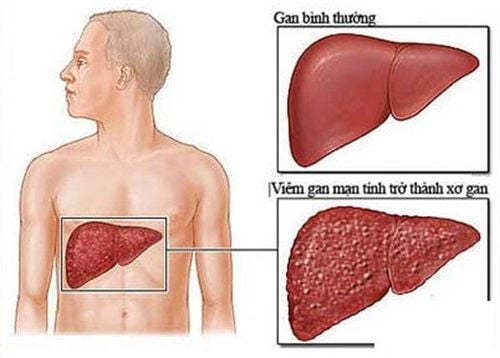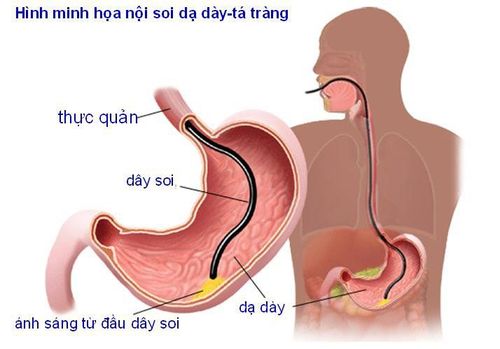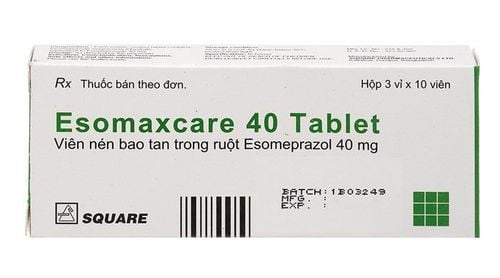This is an automatically translated article.
Gastrointestinal bleeding in children often has no obvious symptoms before vomiting, vomiting blood or black stools appear. Most cases of GI bleeding in children today are caused by gastrointestinal diseases such as peptic ulcers.
1. What are the causes of gastrointestinal bleeding in children?
Gastrointestinal bleeding is bleeding in the gastrointestinal tract, which can be seen in children and adults with manifestations such as vomiting blood, passing black or bloody stools.
Gastrointestinal bleeding accounts for 10-20% of cases of gastroenterology. However, the degree of bleeding may vary from patient to patient. It can be an emergency that requires prompt diagnosis and treatment, but it can also be a mild presentation that can delay diagnosis and treatment.
Depending on the location of bleeding in the gastrointestinal tract, the disease is classified into 2 types as follows:
Upper gastrointestinal bleeding: The most common type of bleeding, caused by peptic ulcer, gastroesophageal reflux disease or rupture – Esophageal varices, Mallory Weiss syndrome. Lower gastrointestinal bleeding. Causes of upper gastrointestinal bleeding in children include:
Blood clotting disorders; Gastritis; Stress ulcers; Esophagitis caused by gastroesophageal reflux; Vascular malformations; Rupture, varicose veins of the esophagus; Mallory-Weiss tear. Causes of lower gastrointestinal bleeding in children include:
Infective enteritis; Anal fissure; Colon polyps ; Intussusception ; Bowel volvulus; Meckel's diverticulum ; Scholein Henoch; Vascular malformations; Hemolytic-uremic syndrome; Inflammatory bowel disease. Currently, according to some medical studies, the main cause of gastrointestinal bleeding in children and adults is complications of peptic ulcer. Peptic ulcer disease is usually caused by Helicobacter pylori. This type of bacteria is very easy to spread through eating and drinking by sharing bowls, chopsticks, cups, cups, living utensils with people infected with HP bacteria.

Xuất huyết tiêu hóa ở trẻ em thường không có biểu hiện rõ rệt trước khi xuất hiện tình trạng nôn, ói ra máu
2. Signs of gastrointestinal bleeding in children
Usually, children with gastrointestinal bleeding have no obvious symptoms until vomiting, vomiting blood or black stools appear. Most cases of gastrointestinal bleeding in children today are caused by gastrointestinal diseases such as peptic ulcer that causes bleeding, also known as gastric congestion.
Children with gastrointestinal bleeding often have some of the following manifestations:
gas, bloating; Nausea and vomiting; Burning pain in the abdomen; Chest pain ; Weight loss, fatigue; Frequent heartburn, hiccups; Loss of appetite, difficulty swallowing; Halitosis; Diarrhea; Anemia; Vomiting blood ; Blood in the stool; Pass black stools. These symptoms are very common in children when sick. It doesn't have to be a peptic ulcer to cause gastrointestinal bleeding, but it can also be a necessary warning for doctors to recognize and find the cause and effective treatment.
4. How to diagnose gastrointestinal bleeding in children?
Diagnosis of gastrointestinal bleeding in children should be based on:
Medical history examination; Blood test (if necessary); Gastrointestinal endoscopy: Depending on upper or lower gastrointestinal bleeding, gastroscopy or colonoscopy should be performed to determine the exact cause and have reasonable treatment measures; Your doctor may recommend an abdominal ultrasound, a contrast-enhanced gastrointestinal X-ray, or a contrast-enhanced colonoscopy (if necessary).
5. How to treat gastrointestinal bleeding in children?
Treatment of GI bleeding in children will depend on the cause and extent of the disease, specifically:
Severe life-threatening gastrointestinal bleeding requiring blood transfusion. Upper gastrointestinal bleeding usually resolves spontaneously with medical treatment, so emergency laparoscopic surgery is rarely needed. Should carry out endoscopy in the operating room, in combination with the surgeon to prevent the failure of endoscopic hemostasis, surgery will be performed immediately. For surgical causes such as intussusception, polyps, and Meckel's diverticulum, surgery is indicated to treat all causes.

Điều trị xuất huyết tiêu hóa ở trẻ em sẽ tùy thuộc vào nguyên nhân và mức độ của bệnh
6. Prevention of gastrointestinal bleeding in children
Gastrointestinal bleeding in children can be prevented by:
Helping children create a balance between study and entertainment, reducing stress. Teach children the habit of washing hands, cleaning the living environment and keeping their personal hygiene clean. Take the child to the doctor when there are abnormalities in the gastrointestinal tract. Gastrointestinal bleeding in children is quite dangerous, you should not be subjective but need to take appropriate treatment methods for the child to have good health. If the child is given medical treatment but has abnormal signs or the condition shows no signs of improvement, it is necessary to take the child to see a doctor to avoid unwanted consequences.
Pediatrics department at Vinmec International General Hospital is trusted by many parents to examine the diseases that babies and children have. Vinmec brings satisfaction to customers and is highly appreciated by industry experts by:
Gathering a team of leading pediatricians: including leading experts with high professional qualifications ( professor, associate professor, doctorate, master), experienced, worked at major hospitals such as Bach Mai, 108... The doctors are well-trained, professional, conscientious - understanding and understanding young psychology. In addition to domestic pediatric specialists, the Department of Pediatrics also has the participation of foreign experts (Japan, Singapore, Australia, USA) who are always pioneers in applying the latest and most effective treatment regimens. . Comprehensive services: In the field of Pediatrics, Vinmec provides a series of continuous medical examination and treatment services from Newborn to Pediatric and Vaccine,... according to international standards to help parents take care of their baby's health from birth to childhood. Advanced techniques: Vinmec has successfully deployed many specialized techniques to make the treatment of difficult diseases in Pediatrics more effective: neurosurgery - skull surgery, stem cell transplantation blood in cancer treatment. Professional care: In addition to understanding children's psychology, Vinmec also pays special attention to the children's play space, helping them to play comfortably and get used to the hospital's environment, cooperate in treatment, improve the efficiency of medical treatment.
Please dial HOTLINE for more information or register for an appointment HERE. Download MyVinmec app to make appointments faster and to manage your bookings easily.













